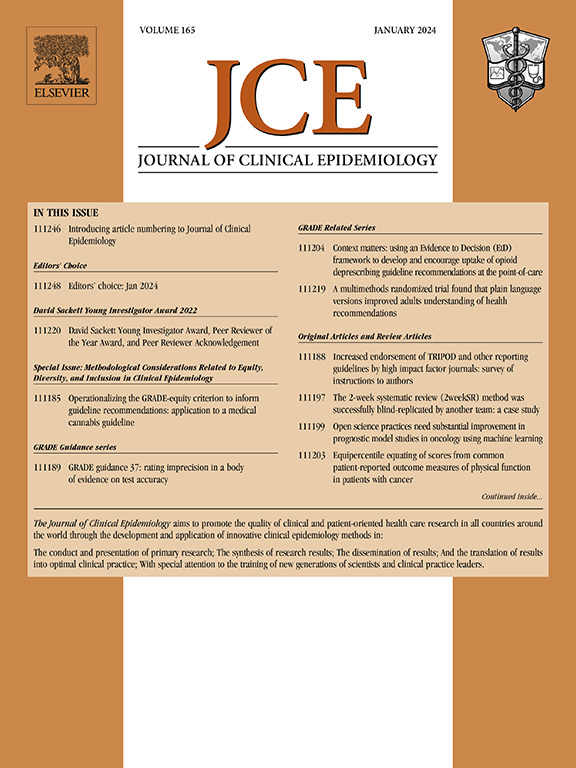范围审查的作者认为知识用户咨询是有益的,但并非没有挑战:一项定性研究。
IF 5.2
2区 医学
Q1 HEALTH CARE SCIENCES & SERVICES
引用次数: 0
摘要
背景:范围审查是一种流行且有影响力的证据合成形式。指南先前强调了在范围审查中进行知识使用者(KU)磋商的重要性;然而,迄今为止,它们的使用受到限制,指南对它们的方法和使用适应症也不清楚。这导致了KU咨询方法的模糊性和不确定性。我们的目的是探索范围审查作者在范围审查中使用KU咨询的观点和经验。方法:采用描述性定性研究设计。我们招募了以前进行过KU咨询的范围审查作者,参加了个人的半结构化访谈,重点关注范围审查中KU咨询的行为、价值、效用和影响,以及进行这些咨询的障碍和推动因素。我们使用反身性主题分析来分析访谈。结果:共访谈15次,16人(1对)。我们确定了三个主题;“在范围审查中进行KU磋商的动机”,“谁,什么和如何在范围审查中进行磋商”,以及“促进增长:经验教训和未来步骤”。结论:作者认为KU咨询是范围评估的一个有价值的方法学组成部分;但是,需要有足够的资源和能力来进行这些活动。关于什么是咨询,以及如何最好地进行咨询,特别是与其他形式的KU参与一起,也缺乏明确和共识。需要进一步的指导,以澄清KU磋商在范围审查中的作用。简单的语言总结:范围审查是对特定主题的知识进行总结的一种方式。在这项研究中,我们研究了研究人员如何在范围审查中使用“知识用户咨询”。知识用户(KU)是可以使用研究结果的患者、政策制定者和医疗保健提供者等人。虽然建议在范围审查中使用KU咨询,但并不经常这样做,并且对于如何以及何时这样做存在混淆。我们采访了16位做过KU咨询的研究人员,作为范围审查的一部分。从这些访谈中,我们发现了三个关键主题:“在范围评估中进行KU磋商的动机”,“在范围评估中进行磋商的对象、内容和方式”,以及“促进增长:经验教训和未来步骤”。总的来说,研究人员认为堪萨斯大学的咨询是有用的,增加了价值,但他们也表示,需要更多的资源和更明确的指导才能正确地做到这一点。关于什么是咨询以及应该如何进行咨询,仍然存在很多不确定性。更详细和实用的指导将有助于使这一过程在未来的研究中更加清晰。本文章由计算机程序翻译,如有差异,请以英文原文为准。
Scoping review authors view knowledge user consultations as beneficial but not without challenges: a qualitative study
Background
Scoping reviews are a popular and influential form of evidence synthesis. Guidance has previously highlighted the importance of conducting knowledge user (KU) consultations within scoping reviews; however, their use has been limited to date, and the guidance is not clear regarding their methodology and indications for use. This has led to methodological ambiguity and uncertainty regarding KU consultation. We aimed to explore the views and experiences of scoping review authors on using KU consultations within scoping reviews.
Methods
A descriptive qualitative study design was used. We recruited scoping review authors who had previously conducted a KU consultation to participate in individual semi-structured interviews focusing on the conduct, value, utility, and impact of KU consultations within scoping reviews and the barriers and enablers to conducting them. We used reflexive thematic analysis to analyze interviews.
Results
We conducted 15 interviews with 16 participants (one dyad). We identified three main themes; ‘Motivations to Do KU Consultations in Scoping Reviews’, ‘The Who, What, and How of Doing Consultations in Scoping Reviews’, and ‘Fostering Growth: Lessons Learned and Future Steps’.
Conclusion
Authors view KU consultations as a valuable methodological component of scoping reviews; however, sufficient resources and capacity are needed to conduct them. There is also a lack of clarity and consensus regarding what defines a consultation and how best to conduct them, particularly alongside other forms of KU involvement. Further guidance is needed to clarify the role of KU consultations within scoping reviews.
Plain Language Summary
Scoping reviews are a way of summarizing knowledge on a particular topic. In this study, we looked at how researchers use "knowledge user consultations" in scoping reviews. Knowledge users (KU) are people such as patients, policymakers, and health-care providers who can use the results of the research findings. Although using KU consultations in scoping reviews is recommended, it is not often done, and there is confusion about how and when to do it. We interviewed 16 researchers who have done KU consultations as part of a scoping review. From these interviews, we found three key themes: ‘Motivations to Do KU Consultations in Scoping Reviews’, ‘The Who, What, and How of Doing Consultations in Scoping Reviews’, and ‘Fostering Growth: Lessons Learned and Future Steps’. Overall, researchers felt that KU consultations are useful and add value, but they also said more resources and clearer guidance are needed to do them properly. There is still a lot of uncertainty about what counts as a consultation and how it should be done. More detailed and practical guidance would help make this process clearer for future research.
求助全文
通过发布文献求助,成功后即可免费获取论文全文。
去求助
来源期刊

Journal of Clinical Epidemiology
医学-公共卫生、环境卫生与职业卫生
CiteScore
12.00
自引率
6.90%
发文量
320
审稿时长
44 days
期刊介绍:
The Journal of Clinical Epidemiology strives to enhance the quality of clinical and patient-oriented healthcare research by advancing and applying innovative methods in conducting, presenting, synthesizing, disseminating, and translating research results into optimal clinical practice. Special emphasis is placed on training new generations of scientists and clinical practice leaders.
 求助内容:
求助内容: 应助结果提醒方式:
应助结果提醒方式:


